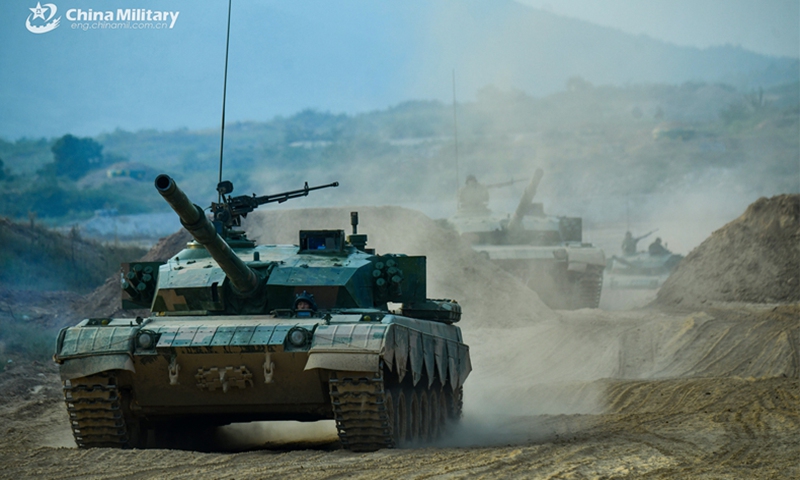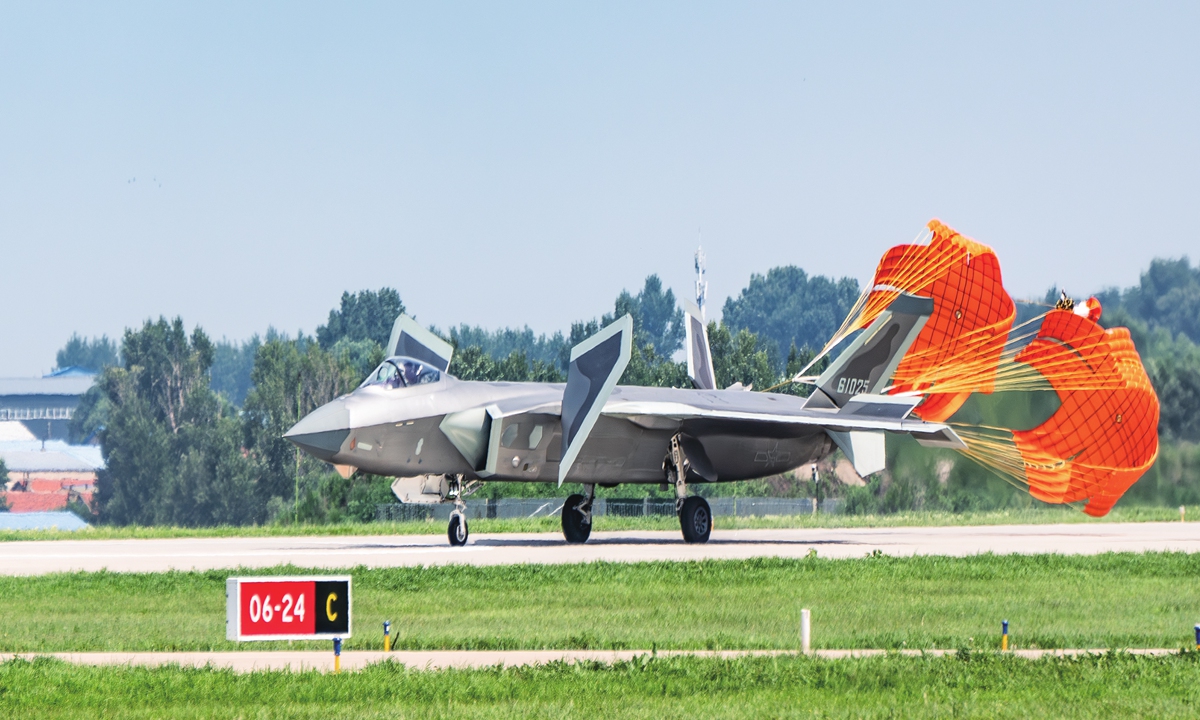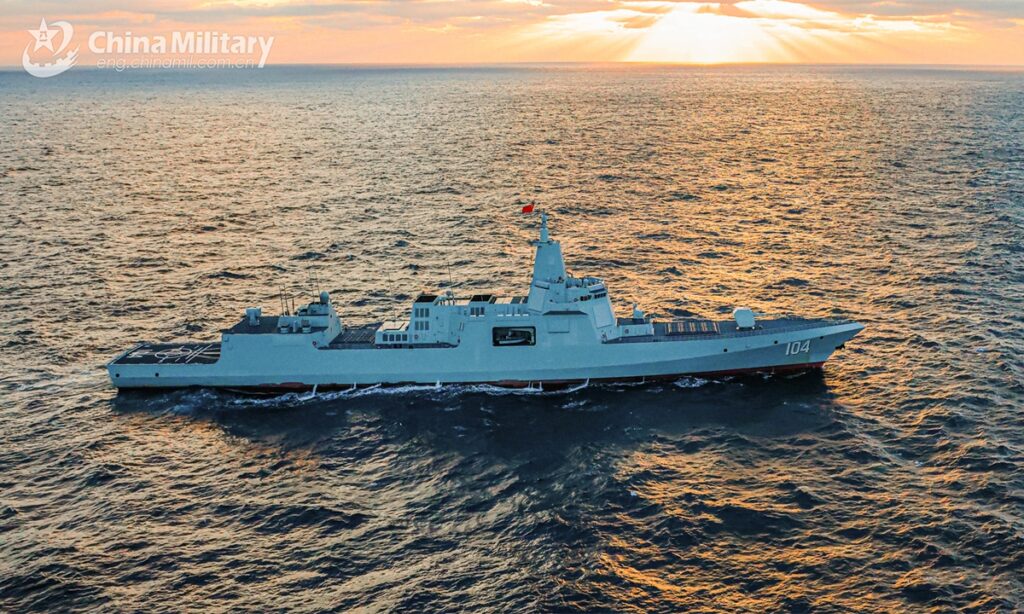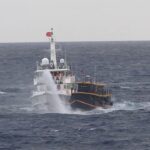The Chinese People’s Liberation Army (PLA) also saw some major milestones over the past year in terms of equipment development.
The PLA Navy revealed in April the commissioning of the seventh and eighth Type 055 10,000 ton-class large destroyers, a type of warship deemed by experts as the world’s best destroyer in terms of comprehensive combat capability.
Shi Hong, executive chief editor of the Chinese magazine Shipborne Weapons, told the Global Times that continued commissioning of Type 055s contributed to the PLA Navy’s combat capabilities, as they are powerful escorts of aircraft carriers and can lead flotillas on their own, giving more tactical flexibility to the PLA Navy.
The first hull of a new type of warship, the Type 054B frigate, was launched as confirmed at a press conference by the Chinese Ministry of National Defense in August. This next-generation warship is expected to succeed the PLA Navy’s workhorse the Type 054A frigate with comprehensive upgrades, media reports said.
In September, the PLA Army announced the induction of its first armed reconnaissance drone, the KVD002, which analysts said will give the Army more tactical flexibility.

Models pose on the deck of the Shandong aircraft carrier Photos: Courtesy of Xie Dahuan
In November, China’s third aircraft carrier, the Fujian, started launch tests for its electromagnetic catapult system in preparation for sea trials. In response to the reports, Senior Colonel Wu Qian, a spokesperson of the Ministry of National Defense, said at a regular press conference later that month that the carrier had been holding mooring tests and would continue its construction steadily according to plan.
2023 was also a big year for the country’s second aircraft carrier, the Shandong. According to media reports, the Shandong held its first far sea exercise beyond the first island chain in the West Pacific in April, followed by two more later in the year that broke records including aircraft sortie rate.
With one of the Chinese military’s main missions being to safeguard national sovereignty, territorial integrity and development interests, equipment developments have served the combat capabilities, experts said.

A main battle tank attached to an Army brigade under the PLA Eastern Theater Command rumbles in speed to a designated training field during live-fire training in late September, 2023. (eng.chinamil.com.cn/Photo by Liu Zhiyong)
In 2023, collusions between “Taiwan independence” secessionist forces and external interfering forces seriously provoked China’s national sovereignty and security, as the US not only approved additional arms sales, but also announced plans to send military aid to the island of Taiwan.
US military vessels and aircraft made several provocative transits in the Taiwan Straits throughout the year, and the National Defense Authorization Act for Fiscal Year 2024 passed by the US Congress in December also approved training for armed forces on the island of Taiwan, according to media reports.
Part of the PLA aircraft carrier Shandong‘s far sea exercise in early April was joining the three-day combat alert patrols and “Joint Sword” exercises encircling the island of Taiwan, which came shortly after a provocative meeting between Taiwan regional leader Tsai Ing-wen and then US House speaker Kevin McCarthy during Tsai’s “transit” in the US.
The large-scale PLA drills involved joint blockade and joint strike as well as seizing of air superiority and control of the sea, creating strong deterrence against collusions between “Taiwan independence” secessionist forces and external interfering forces, and gaining more capabilities and control over the region, experts said.
Besides the Taiwan question, military aircraft and ships from the US, sometimes also from US allies such as Canada and Australia, continued to make frequent close-in reconnaissance operations on China’s doorstep, and in some cases, they even accused China of intercepting them.
Under US’ instigation, the Philippines has repeatedly stirred up troubles over Chinese islands and reefs in the South China Sea since August, but saw their attempts restricted by the China Coast Guard one by one.
The US also held military drills and patrols with the Philippines, and gained access to additional military bases in the Philippines, with analysts saying that the US sees the Southeast Asian country as an important foothold in the southern end of the first island chain to contain China militarily.
Signs of Japan’s right-wing military ambitions that go along with the US’ “Indo-Pacific Strategy,” including accelerated deployment plan of missiles that can strike foreign countries, have also raised vigilance among Chinese experts.
“2023 has not been a peaceful year. This applies to China because the US intensified the layout of its ‘Indo-Pacific Strategy,’ but also to the whole world because of the Palestinian-Israeli and Russian-Ukrainian conflicts,” Song Zhongping, a Chinese military expert, told the Global Times.
Against this background, the Chinese military firmly defended national sovereignty, security and development interests against relentless provocations from the US-led West, as the PLA has strengthened its combat preparedness and worked together with friendly countries to safeguard peace and stability in the region, Song said.

A J-20 is on display at the 26th Changchun Airshow in Changchun, Northeast China’s Jilin Province, on July 26, 2023. Photo: VCG
Throughout the year, the Chinese military communicated with foreign militaries through various channels including the Shangri-La Dialogue and the Beijing Xiangshan Forum, held a number of joint exercises or joint patrols with countries including Russia, Pakistan, ASEAN members and countries in the Middle East, and had vessels visiting countries in Africa, Southeast Asia and South Pacific among others, providing elements of stability to the world, analysts said.
Song said 2024 will see many variables that could cause uncertainties to the world, so the duties the Chinese military have to carry out could become even heavier. “But I’m confident that the PLA has the capability to safeguard national sovereignty, security and development interests.”
Observers are keen to see when aircraft carrier Fujian will make its maiden voyage test, and what the PLA Air Force will display at the 2024 edition of the Airshow China.
Force of peace
Experts stressed that the Chinese military is not only a powerful force, but also a peaceful force.
China regularly sends troops to UN peacekeeping missions, and 2023 also marked the 15th anniversary of the PLA Navy’s escort missions in the Gulf of Aden and waters off Somalia, with 45 task forces having escorted commercial ships, Chinese and foreign, through the pirate-infested waters, winning wide appreciations from the international community, the PLA Daily reported.
In April, a PLA Navy escort task force conducted an emergency evacuation mission of Chinese personnel in Sudan amid deteriorating security situation in the African country. The Chinese warships not only evacuated 940 Chinese nationals but also 231 foreign nationals under requests by their own countries.
In summer, the PLA Navy’s Peace Ark hospital ship visited five countries in the South Pacific, sailing across 12,000 nautical miles and hosted more than 40,000 diagnoses and treatments there.
The PLA Air Force’s Y-20 transport aircraft have, for several times, conducted international disaster relief and humanitarian aid missions abroad, including sending rescue aids to Afghanistan and Nepal this year.
The Chinese military contributes to global peace and stability, and it takes concrete steps to carry out the country’s initiative of building a global community of shared future, another Chinese military expert who requested anonymity told the Global Times.
“The PLA has always been a force of justice and peace. China never sets off rows, but it is surely capable of resolving them if others impose them upon China,” the expert said.




